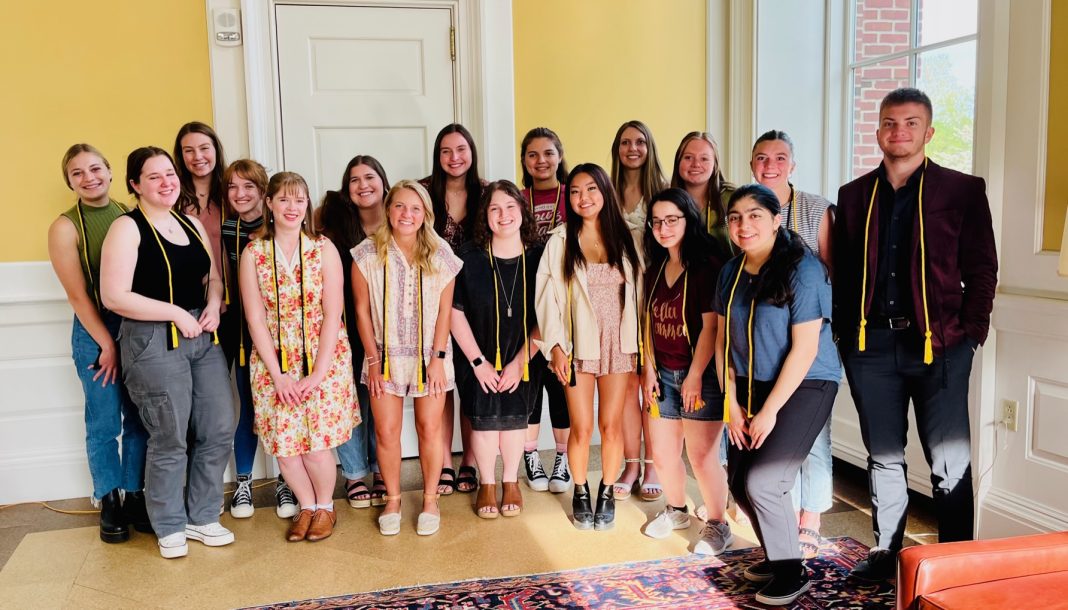Following the extension of one of DePauw’s most distinctive academic programs until 2028, directors Rebecca Schindler and Amy Welch outlined their plans to remodel the structure of the Honor Scholar Program to adapt to students’ curriculum-based needs.
These structural changes are in line with the university’s implementation of the Bold and Gold 2027 Strategic Plan, which involves the recent establishment of a three-school model. While other fellowship programs such as Management Fellows, Media Fellows, Science Research Fellows, Environmental Fellows, and Global Studies Fellows

fall under particular categories of the institutional model, Schindler and Welch aim to connect the three schools through the Honor Scholar Program.
“The Vice President for Academic Affairs joined us for [our last] steering committee…and charged our committee with thinking about a remodeling of the current [Honor Scholar] program,” Schindler said. “[We believe that] the program can be a space for a kind of bridge building…not just within the College of Liberal Arts and Sciences, but across the linkage between the three schools.”
She also highlighted notable student projects that incorporated a wide spectrum of academic fields. “We have a student who's working on sustainable golf courses and she's got an environmental scientist on her thesis committee and you know, the Dean of the Business School, right? Because it's a business problem, right? We have students who are writing creative poetry, about women in motorsport…two things you never thought the same, but that is what they're passionate about.”
Moreover, Schindler and Welch are discussing the possibility of incorporating the Honor Scholar curriculum into students’ majors, while maintaining the four principle “I’s” of the program: inquiry, interdisciplinary, integration, and innovation.
“We are thinking about things like . . . we could put out a survey [on] what should we call the interdisciplinary honor?... But I don't think it means we should get rid of the interdisciplinary space that the honor scholar program has had for so long,” Schindler said.
Welch further elaborated on how the Honor Scholar program has served as a model for DePauw’s academic curriculum for several years. “So, you have the 2-2-2 [distribution areas for] DePauw students, requiring two social sciences, natural sciences, [and other academic fields]—that's modeled on the Honor Scholar’s 1-1-1 [model]. The First-Year Seminar program that was instituted 19 years ago…that was built on the Honor Scholar program having the First-Year Seminar. So I think this is a really kind of exciting moment that we can [have] if we can come up with something that would still hold the essence of the program,” she added.
To aid the remodeling process, the directors are also coordinating with their student advisory council to potentially implement a mentorship system within the Honor Scholar program.
“There is a disconnect that students feel sometimes [as they think], ‘OK, I've taken these five seminars, but I don't really know what it means to do with thesis, right?’ And so one thing that we are cognizant of is, if not like a direct mentor-to-mentee [system, we’re thinking of] pairing students [to provide] more opportunities for underclassmen to interact with their seniors who are writing, who are working on their thesis project,” Schindler said, highlighting how this also benefits seniors by building a stronger community while they pursue independent projects.
In line with administrative requests, admissions for incoming Honor Scholars will also be reduced to approximately 40 students. Despite this decision providing more room for lateral entry, Schindler and Welch are still working with the admissions office to maintain a holistic selection process for prospective applicants.
“Speaking for myself personally, I am a bit nervous about having an elite group of students,” Welch said. “Shrinking the size of the program [could overlook] the fact that we don't look at those traditional markers like SAT, ACT, [and] high school GPA because we're not interested in those students necessarily that can regurgitate information for a standardized test. We're interested in those thinking students.”
Furthermore, when asked about the possible extension of the program beyond 2028, both directors emphasized their focus on remodeling the existing structure to adapt to administrative changes. These modifications will be outlined this semester to ensure a timely recruitment process for prospective students.
“I think it's kind of an exciting time to kind of re-envision it for today's curriculum and for today's students,” Welch highlighted. “And I think our faculty would agree with me that . . .whatever shape and model the program takes in the future, that those particular core pieces remain true to the history of the program.”



